Why study this course with LJMU?
- Join our multi award-winning School - 'Nurse Education Provider of the Year (pre-registration)' 2021 Winner and 'Best Student Experience' 2020 Winner (Student Nursing Times Awards).
- £5,000 a year grant for Nursing students living in England, Wales and Northern Ireland plus another £2,000 for students with dependent children (eligibility criteria apply).
- Learn in state of the art professional-standard clinical practice simulation suites complete with cutting edge teaching and learning technology.
- Approved by the Nursing Midwifery Council (NMC)
- 95% of students surveyed said the academic support on our nursing courses was good or very good (National Student Survey 2024)
About your course
Studying on our NMC accredited BSc (Hons) Nursing (Adult) degree will give you the opportunity to complete practice learning placements in a variety of settings, including hospital and out of hospital settings, and in simulated practice learning placements.
Qualify as an adult nurse with Liverpool John Moores University. When you choose our BSc (Hons) Nursing (Adult) degree, you will gain the skills, experience and confidence to become a Registered Nurse delivering excellent patient care.
The degree is three years full time.
Adult nurses care for adults of all ages in both acute and long-term care. You will have lots of opportunities for practice learning experiences that reflect this. Placements cover a variety of settings, including the traditional hospital environment, and in the community, in places like nursing homes, home environments, clinics and treatment rooms. You will also have the chance to undertake civic engagement placement learning opportunities, such as working with charities. This wide range of experience will give you vital skills in assessing, planning, delivering and evaluating patient care and needs.
Our adult nursing degree combines practice with theory, and there is lots of support available to help you achieve your potential and progress through your course successfully. In each academic year, you will undertake five theory assessments: one for each module, and one practice module. We use a variety of authentic assessment methods that reflect real-world practice, such as simulated patient conversations and clinical skills tests.
You may also be interested in our BSc (Hons) Child Nursing or BSc (Hons) Mental Health Nursing courses. Or, if you already hold an undergraduate degree in any subject, you may be eligible to apply for our two-year qualifying MSc Adult Nursing programme.
Course modules
What you will study on this degree
All modules in the programme are core.
Each year has five theory modules and a practice learning module. The modules ensure that all of the professional requirements for registered nurses are met.
Level 4 modules:
- Professional Practice in Nursing
- Professional Values in Nursing
- Person-centred Nursing Care
- Partnership Working and Shared Decision Making
- Promoting Health and Preventing Ill Health
- Introduction to Practice Learning
Level 5 modules:
- Health Promotion and Health Policy
- Assessment in Adult Nursing
- Complexities in Adult Nursing Care
- Nursing Practice within Legal and Ethical Frameworks
- Interprofessional Collaboration in Nursing
- Developing Practice Learning
Level 6 modules:
- Person Centred Care Planning in Adult Nursing
- Leadership and Quality Enhancement
- Health Economics and Health Policy
- Managing Risk in Adult Nursing
- Nursing Interventions and Prescriber Readiness
- Advancing Practice Learning
Further guidance on modules
Modules are designated core or optional in accordance with professional body requirements, as applicable, and LJMU’s Academic Framework Regulations. Whilst you are required to study core modules, optional modules provide you with an element of choice. Their availability may vary and will be subject to meeting minimum student numbers.
Where changes to modules are necessary these will be communicated as appropriate.
Core modules
Professional Practice in Nursing
20 credits
20 credits
This module will enable you to understand, consider and demonstrate the professional principles that underpin your practice, specifically the NMC Code, your personal and others’ expectations as an ambassador for the role. The module will consider the legal and ethical frameworks underpinning practice, as well as how to care for yourself and others.
Professional Values in Nursing
20 credits
20 credits
This module will develop your understanding of the values and behaviours that are expected in nursing and to explore how the evidence base is used to underpin nursing practice, considering the provision of care in a non discriminatory manner.
Person Centred Nursing Care
20 credits
20 credits
This module will facilitate you to understand key anatomy and physiology and physical and psychological health across the lifespan. The module will explore the impact of medicines, develop your understanding of pharmacology, and how these link to your ability to deliver effective person centred care.
Partnership Working and Shared Decision Making
20 credits
20 credits
This module will introduce students to the principles of partnership working and shared decision making with service users, carers and families, considering communication, capacity and reasonable adjustments.
Promoting Health and Preventing Ill Health
20 credits
20 credits
This module aims to develop the underpinning knowledge to support the role of the nurse in health promotion, health protection and the prevention of ill health, considering health inequalities, social determinants and infection control.
Introduction to Practice Learning
20 credits
20 credits
This module will introduce and develop the principles professional practice and introduce the scope of competencies for the role of the nurse, guided by the NMC Standards of Proficiency for the Registered Nurse. This module will run alongside your practice placements and will introduce the skills required for nursing practice, enabling you to engage with care of individuals across different health and care settings.
Governance of nursing procedures (Annexe B) theory will reside in practice modules and will be delivered via a blend of directed and independent leaning with some face to face delivery
Core modules
Health Promotion and Health Policy
20 credits
20 credits
This module will enable you to explore the factors that influence the health and wellbeing of individuals, and the health choices and policies that impact on health., taking into account the role of the nurse in facilitating access to care.
Interprofessional Collaboration in Nursing
20 credits
20 credits
This module will develop an understanding of the nurses’ role in interprofessional collaboration across a range of health care settings. In addition there will be an exploration of individual roles and responsibilities when dealing with major incidents.
Nursing Practice within Legal and Ethical Frameworks
20 credits
20 credits
This module will develop explore the concept of risk, and the legal and ethical considerations and frameworks that underpin safe practice, including risk assessments, safe staffing, consent and information sharing.
Assessment in Adult Nursing
20 credits
20 credits
This module will develop your understanding of assessing, monitoring and planning care in adult nursing. You will also explore research methods and ethics and the application of an evidence-base to your practice. In this module the indicative content will specifically be applied within the context of Adult Nursing.
Complexities in Adult Nursing Care
20 credits
20 credits
This module will develop your critical understanding of the complexities of care in adult nursing, including end of life, commonly encountered challenges, and prioritising care. In this module the indicative content will specifically be applied within the context of Adult Nursing.
Developing Practice Learning
20 credits
20 credits
The aim of this module is to support students in achieving proficiencies for registered nurses that are aligned to Part 2 of the Practice Assessment Document. In addition, students will be directed and supported to develop an understanding of the theory that underpins the NMC Standards of Proficiency Annexe B Nursing Procedures.
Core modules
Leadership and Quality Enhancement
20 credits
20 credits
This module will equip the student with the underpinning knowledge required for leading and managing care, including delegation and supporting staff. They will also develop skills to monitor risk and evaluate and enhance quality of care.
Health Economics and Health Policy
20 credits
20 credits
This module will enhance the students understanding of health legislation and current health and social care policies and their influence quality of care, patient safety. They will also develop an understand of the principles of health economics and their relevance to resource allocation in health and social care organisations .
Nursing Interventions and Prescriber Readiness
20 credits
20 credits
This module explores the nurse's role in the instigation of appropriate investigations their interpretation and the implementation of appropriate interventions when meeting individual care needs. This module will also prepare the student to progress to a prescribing qualification following registration
Managing Risk in Adult Nursing
20 credits
20 credits
This module will enable you to understand the concept of risk and to identify and appropriately respond to risk within individuals and organisations in adult nursing. In this module the indicative content will specifically be applied within the context of Adult Nursing.
Person Centred Care Planning in Adult Nursing
20 credits
20 credits
This module will explore decision making within the context of individualised care in adult nursing. In this module the indicative content will specifically be applied within the context of Adult Nursing.
Consolidating Practice Learning
20 credits
20 credits
The aim of this module is to support students in achieving proficiencies for registered nurses that are aligned to Part 3 of the Practice Assessment Document. In addition, students will be directed and supported to develop an understanding of the theory that underpins the NMC Standards of Proficiency Annexe B Nursing Procedures.
Professional accreditation
This programme is accredited by the Nursing and Midwifery Council (NMC) and aligned to the Standards for pre-registration nursing programmes (NMC, 2023).
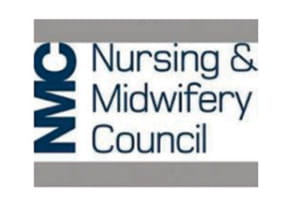
Your Learning Experience
Excellent facilities and learning resources
Your learning journey has been designed to be inspiring and motivating, provide tailored support, and to meet the specific NMC requirements for registered nurses.
You will learn through a mix of:
- lectures
- seminars
- group work activities
- simulation skills development sessions
- practice placements in a range of settings
- tutorials.
We use an active blended learning approach. This means you will attend face to face teaching on campus - usually at the School of Nursing and Advanced Practice, based in the Tithebarn Building (part of our City Campus), along with independent learning and work online. Examples of online activity include tutorial discussions, discussion boards and collaborative or individual projects such as wikis, padlets, blogs and e-portfolios.
The programme is 50% practice learning experiences and 50% theory. You will undertake blocks of practice and blocks of theory-based learning. Each week is 40 hours.
You will be taught by a team of professionally qualified and experienced academic staff, many of who are still also working in clinical practice, and supported by a team of skilled technicians and practitioners.
Dedicated personal tutor, plus study skills support
As soon as you enrol at LJMU, you will be assigned your own personal tutor. Your tutor will give you feedback on how well you are progressing with your studies and encourage you to plan for your educational and career development.
During your practice learning experiences, you will work alongside experienced nurses and be supervised by practice assessors, as well as having the support of academics and Practice Education Facilitators.
All new students coming in to the faculty will also have a Student Mentor allocated to them. Student Mentors are second and third year students who have been selected and trained to mentor new students in all aspects of university life. The student mentor service offers an exciting opportunity for personal and professional development.
Additional support is always available within the Faculty or from LJMU's student services if you need it.
We encourage students to take advantage of the study skills support available through Library Services. This covers everything from how to find the books or journals you need, through to the correct way of referencing them in your assignments.
Assessment varies depending on the modules you choose, but will usually include a combination of exams and coursework.
You will have both formative and summative assessments throughout the programme.
Formative assessments are diagnostic in nature and focus on your development, identifying strengths and areas for improvement, in addition to providing you with feedback on your progress during the learning process.
The feedback may come from several sources, including academic staff, practice supervisors and assessors, service users and wider university support staff. You may receive this verbally or in written format. Formative feedback and feedforward are helpful in your development throughout the modules.
Examples of formative activities include discussion boards to develop learning networks, a reading log, article reviews and group presentations.
Summative assessments are the module assessments that you need to pass to receive the credits for the module. Learning outcomes for the module will describe the knowledge, skills or expertise that you will need to demonstrate you have acquired in order to pass the assessment. As an undergraduate student, the pass mark for your assessments is usually 40%.
The assessments for each module have been designed to align with the learning outcomes and be authentic to nursing practice. This means that assessments will require you to use the same competencies, or combinations of knowledge, skills, and attitudes that you will need to apply in your professional life.
Where you will study
Part of the City Campus, the School of Nursing and Advanced Practice is based in the Tithebarn Building, adjoining the Avril Robarts Library, which is open seven days a week. In addition to specialist clinical practice suite facilities, you will find high quality seminar rooms, IT suites and lecture theatres, plus a café and social spaces.
Course tutors

Sam Pearson
Programme Leader
As an LJMU Nursing graduate, I am committed to delivering excellent nurse education here at Liverpool John Moores. I worked as Health Visitor across the the North West prior to joining the university as a lecturer in 2019. I have experience in supporting practice learning as a module leader and interim practice lead, and have also been field lead for adult nursing as well as a cohort leader. My interests include student experience, supporting research in undergraduate nursing programmes and social determinants of health.
-
 Lecturer/ Senior Lecturer
Lecturer/ Senior Lecturer -

-
 Lecturer/Senior Lecturer
Lecturer/Senior Lecturer -
 Lecturer
Lecturer


I was a healthcare assistant for 10 years but had always wanted to take the next step and become a registered nurse. LJMU stood out because the staff and students are so passionate about nursing. Each year I feel proud of how far I have come, especially as a mature student with a child.
Career paths
With an LJMU BSc (Hons) Adult Nursing degree, you will enjoy an exciting career opportunities both in the UK and overseas.
Successful completion of the course allows you to apply for registration on the Nursing and Midwifery Register, regulated by the Nursing and Midwifery Council. This can lead to careers in the health sector at home or abroad and in the private and voluntary sectors.
There are a growing number of nurse specialist posts in some clinical areas too. Some graduates prefer to pursue careers in teaching, research or management, or continue their studies with a masters programme.
95% of our adult nursing graduates go on to employment or further study within 15 months of graduating (Source: discoveruni.gov.uk)
Student Futures - Careers, Employability and Enterprise Service
A wide range of opportunities and support is available to you, within and beyond your course, to ensure our students experience a transformation in their career trajectory. Every undergraduate curriculum includes Future Focus during Level 4, an e-learning resource and workshop designed to help you to develop your talents, passion and purpose.
Every student has access to Careers Zone 24/7, LJMU's suite of online Apps, resources and jobs board via the LJMU Student Futures website.
Tuition fees and funding
- Full-time per year:
- £9,535
Fees
The fees quoted above cover registration, tuition, supervision, assessment and examinations as well as library membership and student IT support with access to printed, multimedia and digital resources including programme-appropriate software and on campus Wi-Fi.
Financial Support
The University offers a range of scholarships to support students through their studies. You'll find all the information you need on our specialist funding pages, including details of the Student Support Fund and other activities to support with the cost of living.
Additional Costs
In addition to fees, students should also keep in mind the cost of:
- Accommodation
- Travel costs including those for placements, visas and travel for studying abroad and field trips unless paid for by LJMU
- Stationery, IT equipment, professional body membership and graduation gown hire
The University reserves the right to increase tuition fees in accordance with any changes to the maximum allowable fees set by the UK Parliament. In the event of such a change, any fee increase will be subject to a maximum cap of 10% of the total course cost as originally stated at the time of your offer.
Additional fees you may need to factor in are travel costs to placements and parking if using a car whilst on placement. However, you may be able to claim reimbursement of travel costs through the Learning Support Fund provided by the NHS Business Services Authority (NHSBSA).
Students who would like to buy extra uniform items, further to their standard uniform which is included in the course fees, have the option to do so.
International experiences may incur costs.
Entry requirements
Please choose your qualifications below to view requirements
Grades/points required from qualifications: 104-112
Work out how many UCAS points your qualifications are worth by visiting the UCAS Tariff Calculator.
Qualification requirements
GCSEs and equivalents
Evidence of Grade 4 or grade C or above in English Language and Mathematics/ Numeracy
GCSE Equivalences accepted:
• Key Skills Level 2 in English/Maths
• NVQ Level 2 Functional skills in Maths and English Writing and or Reading
• Skills for Life Level 2 in Numeracy/English
• Higher Diploma in Maths/English
• Northern Ireland Essential Skills Level 2 in Communication or Application of Number
• Wales Essential Skills Level 2 in Communication or Application of Number
A levels
BCC-BBC Minimum Number of A Levels: 2
Maximum AS UCAS Points: Maximum 20 points
BTECs
Extended Diploma: DMM
Access awards
Acceptable on its own and combined with other qualifications
Pass overall with a minimum of 104 points including relevant subjects.
International Baccalaureate
Acceptable on its own and combined with other qualifications from a relevant subject
OCR Cambridge Technical
Acceptable on its own and combined with other qualifications from a relevant subject
Irish awards
Irish Highers
Acceptable on its own and combined with other qualifications from a relevant subject. We will also accept the Irish FETAC in Nursing Studies. The following modules must be achieved at Distinction: Anatomy and Physiology, Human Growth and Development, Introduction to Nursing
T levels
Acceptable on its own and combined with other qualifications.
You need to obtain the required UCAS points from a related subject area.
Additional requirements
-
Assessment required
All applicants are required to pass an admissions assessment
Further information
-
DBS, Occupational Health requirements
All applicants will be sent an admissions assessment that they must complete. Once assessments are submitted your application will be reviewed by the admissions team. In certain cases we may follow the assessment with an interview.
-
RPL
Recognition of prior learning that is capable of being mapped to the Standards of proficiency for registered nurses and programme outcomes, up to a maximum of 50 percent of the programme, is permitted (NMC Standards for pre-registration nursing programmes, 2023: 1.5).
How to apply
Securing your place at LJMU
UCAS is the official application route for our full-time undergraduate courses. Further information on the UCAS application process can be found here https://www.ljmu.ac.uk/study/undergraduate-students/how-to-apply.
Applicants who hold, or expect to gain the entry requirements, will be sent a link to take a Nursing Aptitude Assessment via our online assessment service Clevry.
There are two elements to the assessment: the first part focuses on personality and is based on psychometric testing. It is designed to evaluate your behavioural traits and characteristics and is multiple choice.
The second element focuses on situational analysis. You will be presented with a number of scenarios that you may encounter as a student nurse. There will be multiple choice options for you to select an answer from.
Important: For both elements, please do not select the answers you think we are looking for - this is likely to impact negatively on your result and may not give a true reflection of personality and decision-making processes.
Our admissions team will review the results of both elements when making their decision about progressing your application.
Your university life
From accommodation and academic support to clubs and societies. Find out what LJMU has to offer.
Related Links
Talk to our students
Connect with a current LJMU student for advice and guidance on university life, courses and more.
See what our students are saying
At LJMU we want you to know you're making the right choice by studying with us. You can see what our students are saying about their experience with us through their reviews on the following websites:
Related Links
News and views
Browse through the latest news and stories from the university
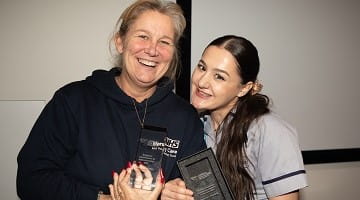

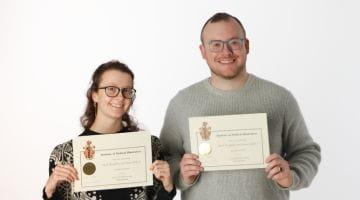
.png)
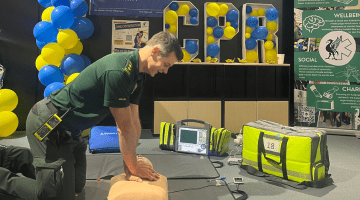

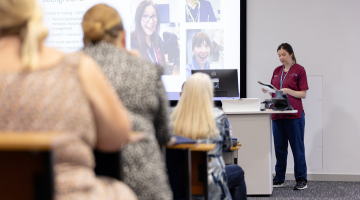



The university reserves the right to withdraw or make alterations to a course and facilities if necessary; this may be because such changes are deemed to be beneficial to students, are minor in nature and unlikely to impact negatively upon students or become necessary due to circumstances beyond the control of the university. Where this does happen, the university operates a policy of consultation, advice and support to all enrolled students affected by the proposed change to their course or module.
Further information on the terms and conditions of any offer made, our admissions policy and the complaints and appeals process.



















